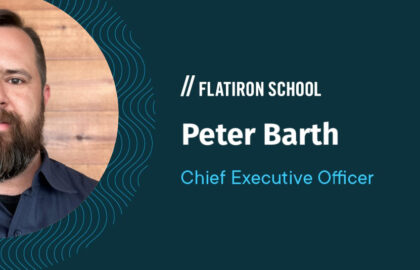Watching Poornima Vijayashanker command huge audiences at presentations and conferences around the world, you wouldn’t expect her to suffer from stage fright. But this talented entrepreneur, engineer, and the author behind Femgineer reveals that even with 20 years of public speaking under her belt—from high school debates to keynotes at international conferences—she still gets nervous before taking the stage. She has, however, found ways to push through her nerves to deliver compelling, confident presentations.
In our online lecture with Poornima, “A Techie’s Guide To Public Speaking, Interviewing, & Making Moves To Level Up Your Career,” she shares how public speaking transformed her from a self-described “shy, awkward kid” into the success she is today, and how viewers can leverage public speaking skills and opportunities to level up their careers.
1. Establish your expertise
Poornima brought up a question that digs into many people’s confidence when they are given the opportunity to present: “Why would anyone care what I have to say?” She points out that no matter what, there will always be someone with less experience than you interested in learning from your story—the challenges you’ve faced, the mistakes you’ve made, the successes you’ve had.
So how do you determine your expertise? Poornima recommends inventorying recent projects you’ve worked on, considering their challenges, how you solved them, what you learned, and what advice you’d give others in your shoes. Early on in her career, Vijayashanker gave presentations on how she built a prototype, launched it, and scaled it for her first business, personal finance management company Mint. She didn’t expect people to be interested, but audience members looking to build, launch, and scale their own businesses found what she had to say valuable. She kept on presenting her experience to growing crowds over the years, establishing herself as an expert on the subject.
Once you’ve determined the experience you want to share, you can establish your own expertise by seeking out as many opportunities as possible to present. Look for conferences, hackathons, and meetups in your industry—they’re looking for people to present more often than you’d expect.
2. Focus on quality networking
While giving those presentations on her experience growing Mint, Poornima quickly realized that speaking at conferences was much more productive way to network than the awkward meet-and-greets she had previously attended. After presenting at events, audience members were more likely to approach her, ask more substantive questions, and form deeper relationships with her. What’s more: career opportunities come up when you speak. Poornima remarked that it seemed like any time she presented her story, someone would offer her a job afterwards.
If you’re seeking a new career, you’ve probably already made yourself discoverable online through LinkedIn, GitHub, and Facebook. Poornima suggests that speaking at events is how to make yourself discoverable offline.
3. Get the interview
So what do you do if you nail your presentation and impressed audience members come up to mention job opportunities at their companies? Use this chance to dig deeper and find out what you’ll need to get an interview: who is the hiring manager and how can you reach them? How long have the positions been open? What can you learn that’ll help you understand the culture of the organization? What are the must-have (and nice-to-have) skills of their ideal candidate?
You’ll also need to tell them about yourself. But just like in your presentation, you’re not sharing your life story, just a slice of your experience in a compelling way. The best way to do this is to create what Poornima calls your personal pitch. “Not too salesy,” she cautions—just who you are, what you do, and where you’re going. Don’t be afraid to get as specific as possible. If you’re too broad (i.e. “I just want to work at a startup”) they might not know where to place you. If you stay specific, even if they don’t have a role that suits you, they might know of other companies in their network looking for a person like you.
4. Nail the interview
Once you get the interview, you can use your public speaking skills to nail it. Be sure to prepare: find out who’s interviewing you; play with their product; anticipate their questions and research what format the interview will take (will it be informal? Will you be coding in the interview?); be prepared to highlight your specific contributions to projects and the results of those contributions.
The interview is also a chance for you to interview the company about the role. Who was in the role before it opened up and what happened to him or her? How does this role fit into the larger team? What is this company’s promotion track? Make sure the company will be a nurturing environment that cares about growing your career.
5. Negotiate the offer: ask now, not later
When you receive an actual offer from the company, Poornima says you need the confidence to negotiate now, not later. You never know what factors will keep you from getting a raise later on. Later there might be a budget cut; later the salary might be capped or you might be graded on performance; later might just be “not a good time.”
Poornima contends that it’s also not about what you think you “deserve,” but about what you can get. This point hit a nerve with viewers. Many asked, “What if you ask for more and they take back the offer?” Poornima’s secret: asking for a higher salary actually builds your credibility. It shows you know your worth and signals that you can do the job. And if you don’t ask for more now, you might even be setting a standard that you’ll always just take what you’re offered that can follow you throughout your career.
Poornima couldn’t think of a single time when she’s heard of a company taking back an offer because a candidate asked for more. On the contrary, she remembers a colleague sharing the story of being told by her firm’s founding partner that, at first, he didn’t think anything of her because she hadn’t negotiated her salary: and “when you don’t negotiate, to me, it means that you’re not going to go to bat for us, you’re not going to go to bat for our companies, you’re not going to go to bat when we need to fundraise.”
Making bold salary requests, interviewing, and networking can all be scary, especially for people at the start of their careers. That’s one reason Poornima suggests diving headfirst into public speaking. Every time you present, you’ll gain a little more confidence that you can access to tackle the challenges your career. To get viewers started, she offered an easy technique: stretching your body into the power pose, which immediately changes the chemistry in your brain, giving you a confidence boost. Give it a try!
Watch the full lecture
Interested in hearing more of Poornima’s advice? You can watch a replay of the full online lecture below:
And be sure to download Poornima’s new book, Present! A Techie’s Guide to Public Speaking.




